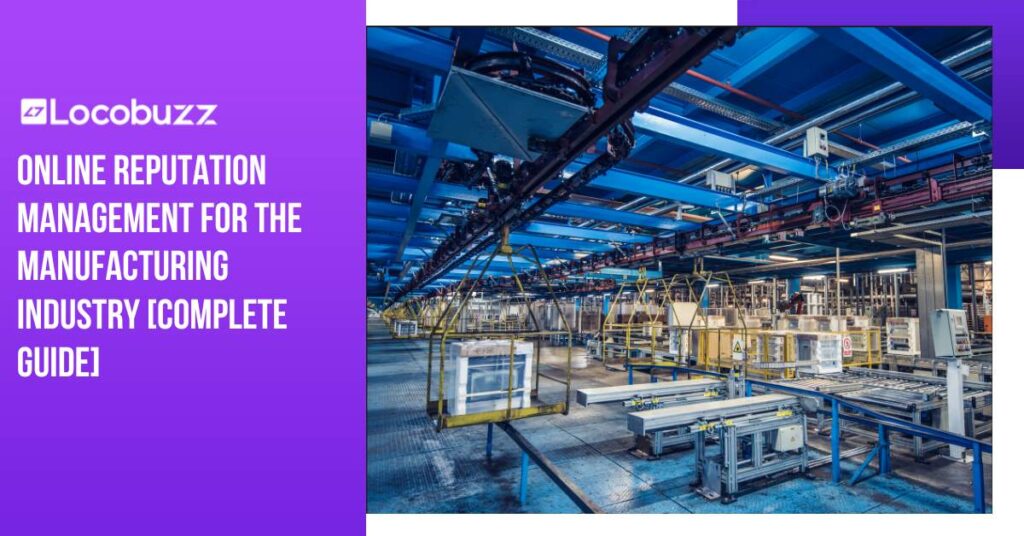Online Reputation Management for the Manufacturing Industry [Complete Guide]

A company’s name isn’t just made up of its products and services – it is made up of its customers and how they view the brand. And that reputation is what can make or break any brand.
For manufacturing companies, having a good online reputation is important and this is what most manufacturers struggle with.
For instance, with Volkswagen’s emissions scandal, and the corporate misconduct that ruined their reputation in the market and among their customers, the company had to work really hard to rebuild it. Just one bad move from the company, and the case would have been much worse.
That is how important reputation can be in the manufacturing industry. It not only invites more customers but also builds a lasting relationship with its suppliers, partners, and investors, and maintains a positive reputation of your manufacturing company.
It doesn’t matter if you are a small-scale manufacturing company or a large one, knowing how to manage your online reputation (ORM) is what will add a positive picture of your brand in the customer’s mind.
According to a study conducted by HBR,
“Firms with strong reputations are seen as having more value & attracts better people”
This blog is your guide to everything you need to know about Online Reputation Management (ORM) for the manufacturing industry. Keep reading to find out how this can help your company.
What is Online Reputation Management in the Manufacturing Industry?
Online reputation management (ORM) is the tool used by businesses in the manufacturing industry to manage and shape the online image of their firm and the manufactured product, and its impression in the minds of the potential customers. Manufacturers utilize ORM tools to monitor discussions, reviews, and feedback about their products, services, and the company’s reputation across various online platforms. This is done by actively monitoring and managing what is said about the company, its products, and its employees across search engines, social media, review sites, and the press.
Why is Online Reputation Management (ORM) Important for Manufacturing Industry?
Online reputation management (ORM) for manufacturing companies is all about how your company is perceived online.
If online customers love your company and leave great reviews, it means that your business is going in the right direction. This sets your company apart from your competitors and builds customer loyalty.
ORM also prepares your company to deal with negative situations such as unforeseen reputation crises, critical reviews, or complaints.
So, ORM isn’t only about what people say about your company; it is about how this affects your business and your brand.
Components of Online Reputation Management in the Manufacturing Industry
Online reputation management (ORM) in manufacturing is the process of monitoring, influencing, and managing how a company or brand is seen online. These factors are what help companies maintain their reputation and brand image online. But what exactly are the components?
Let’s learn:
1. Monitoring: Manufacturers must monitor their brand, products, and company mentions across various online platforms, including social media, review sites, and news websites. This includes keeping track of discussions related to product performance, customer experiences, and industry trends.
2. Analysis: Data collected through monitoring efforts is analyzed to learn more about customer sentiment, identify emerging trends, and assess the overall perception of the brand online. Manufacturers can use sentiment analysis tools to assess the tone of online conversations and adjust their strategies accordingly.
3. Engagement: Engaging with customers in the manufacturing industry involves actively participating in online conversations, addressing customer concerns, and resolving issues promptly. This could include responding to inquiries on social media, providing technical support, or offering product demonstrations to potential customers.
4. Managing Content: Manufacturers create and distribute content that resonates with their target audience, such as blog posts, social media updates, press releases, and customer testimonials. By consistently producing high-quality content, manufacturers can increase brand visibility, establish thought leadership, and enhance credibility within the industry.
5. Reviews: Monitoring and managing online reviews and ratings is how manufacturers can maintain a positive reputation for their products. This involves monitoring platforms like Google My Business, and other review sites, to address customer feedback, respond to reviews, and mitigate any negative publicity.
6. Problem-solving: Manufacturers must be prepared to address any negative issues that may arise and that can potentially impact their brand reputation. This includes implementing crisis management protocols, such as rapid response strategies, product recalls, or public relations campaigns, to address challenges swiftly and maintain customer trust.
Tools and Techniques for Online Reputation Management in Manufacturing
There are many tools and techniques available online that can help build the online reputation of your manufacturing firm. These tools provide years of expertise, and a proven track record, and can help increase your brand’s online presence and maintain it. These are:
1. Social Media Monitoring Tools: Locobuzz is a leading social media monitoring tool. It can help your manufacturing company monitor its presence across social media. From identifying the likes, comments, and engagement in your manufacturing company’s social media pages to using the analysis data to make improvements, and publish better content, Locobuzz can manage your manufacturing company’s social media accordingly and help maintain an engaging page.
2. Online Review Management Platforms: Locobuzz can identify and help improve the conversations and reviews going around about your manufacturing company or your product. These are the reviews that customers leave for your company online. Locobuzz can thus help with maintaining your company’s online presence and also address negative reviews.
3. Customer Relationship Management (CRM): Today’s market is hugely customer-centric, so it’s important to maintain a positive relationship with your customers. Locobuzz helps manufacturing companies to track customer interactions, respond effectively with the power of knowledgebase and Locobuzz ResponseGenie.
4. Content Creation and Posting:
Content is what pulls customers to a company or a brand. It is important to both develop high-quality content relevant to your manufacturing company’s USP and then market it accordingly. Locobuzz will take care of how your content is doing online, and what views it’s bringing, help you find what type of content your Target audience prefers, and devise your strategy accordingly.
How to Handle Negative Reputation Crises in the Manufacturing Industry?

A negative reputation can harm your brand in more ways than you know. Prompt and transparent action is needed to address negative reputational problems in manufacturing.
First, you need to take up the issue and communicate clearly with your customers about it. Get to the root of the issue and take corrective action. Communicate directly with externally affected customers and provide regular updates for transparency.
You never really know when an unforeseen contingency or a crisis can attack your brand. Just one hit and it can tarnish your whole firm’s reputation and image. One common problem that all manufacturers face is winning customer trust, keeping customer retention, and hence maintaining a positive image of your firm and product.
So, it’s good to have a well-defined crisis management plan in place that can help you manage the crisis safely, and without much damage.
For instance, remember when Nestle’s Maggi noodles were found to contain excessive amounts of lead and MSG in their packets?
Maggi being one of the most consumed instant noodles in the country, Nestle’s reputation took a huge dip and the incident shook the consumer confidence of the same.
How did Maggi deal with that scandal?
Their initial response to the incident lacked transparency and showed a lack of concern for their customer base, which led the company to struggle with their customer base.
But Nestle then implemented strict testing procedures for Maggi noodles, ensured proper labeling of all the ingredients, and worked on the excessive lead content and the MSG concerns.
Now Maggi is back in the market, and is still every Indian’s preferred instant noodle.
By maintaining awareness, being accountable, and working actively to address the problem, construction companies can reduce reputational damage and regain trust with customers and stakeholders.
Combining Online Reputation Management (ORM) with Brand Management
Because your manufacturing firm is a part of your brand name, combining online reputation management (ORM) with brand management can help manufacturing companies maintain a positive image of their company, and product, and build trust among their customers. To do this, your firm will need to align the ORM strategies with all brand objectives and maintain consistency across all the touchpoints.
By combining ORM with brand strategy, a manufacturing firm can monitor and respond to online conversations about the firm or its product, monitor customer feedback, and deal with any reputational risks. The manufacturing firm can therefore strengthen its brand presence, gain potential customers, and maintain customer loyalty and reputation.
How to design an Online Reputation Management for the Manufacturing Industry?
Designing an Online Reputation Management (ORM) strategy is important for manufacturing businesses because it can help manage the reputation of your product, and also help your business stay on top of its game. Here’s how you can design an ORM strategy for your manufactured product:
1. Understand your Product: Know everything about your product, its specifications, its image, target audience, brand identity, price, and position in the market. Put yourself in your customer’s shoes and find out what need your product is fulfilling for the audience.
2. Set Goals: Note down the goals you want to achieve for your firm with your manufactured product with ORM. Figure out what you want to achieve, and make sure that the goals set are realistic and achievable; whether it’s improving customer satisfaction, increasing brand visibility, or reducing reputational risks.
3. Monitor your product’s online presence: Identify your product’s current online presence with the help of social monitoring tools. Social monitoring is used to monitor your brand’s online presence by identifying how your brand is doing in all the online channels, including social media, and research sites. And work on the strategies accordingly.
4. Engage and Respond: Actively engage your audience in conversations about your manufactured product or business by responding to comments, ideas, and questions in a timely and professional manner.
5. Create high-quality content: Create and share high-quality content that aligns with your manufacturing product’s expertise, values, and customer needs and concerns. This content can include blog posts, videos, infographics, and case studies. For instance, a tour of how chocolates are manufactured in your company through a reel.
6. Building relationships: Build relationships with influencers, media agencies, and stakeholders with the relevant target audience to position your brand & product message better and increase visibility. Collaborate on content, participate in events, and increase your product’s reach and reputation.
7. Monitor and measure: Once you develop the strategy for manufacturing industries, monitor and measure your ORM performance by tracking key performance indicators (KPIs) such as sentiment analysis, engagement metrics, and brand mentions. This will help you modify your ORM strategy accordingly, find out where you’re lacking, and work on improving it.
Discover how Locobuzz can transform Manufacturing Industry with our ORM Capabilities.
How is ORM in Manufacturing Different from Other Sectors?
ORM in manufacturing differs from other industries due to the nature of its products, supply chain, regulations, brand concept, and problem-solving.
The manufacturing process involves complex specifications, most of which require specific technical expertise, coupled with an extensive supply chain involving multiple stakeholders, with the need to maintain reputation throughout the supply chain.
Brand perception in manufacturing is closely related to product quality, reliability, and safety.
Manufacturing companies also face unique risks, different from the other sectors such as product returns or supply chain disruptions, which differ in their crisis management strategies from other industries.
Locobuzz For Online Reputation Management (ORM) in Manufacturing
Locobuzz is an advanced ORM tool that offers several services to maintain the reputation and online presence of manufacturing businesses.
Here’s how Locobuzz works:
Monitoring Brand’s Online Presence: Locobuzz tracks your brand’s online presence, be it on social media, reviews, or news sites. This analysis allows you to identify how your brand is doing online, and you can then take action on it.
Emotional Analysis: Locobuzz allows you to participate deeply in online discussions to analyze sentiment and distinguish between positive, negative, and neutral comments.
Crisis Management: In times of crisis, LocoBuzz gives you the tools to manage the issue effectively. It can help you track the progress of your problem-solving efforts and make adjustments as needed.
Case Study: The Dairy Milk Scandal
In 2014, Cadbury Dairy Milk faced a reputational crisis in India after an alleged lab report about contamination in the Dairy Milk chocolate got leaked. Word spread on social media platforms that Cadbury chocolates contained worms, causing panic among consumers because of the large consumption base of Dairy Milk in India.
To solve the problem and regain its reputation, Cadbury Dairy Milk made use of its PR team and ORM techniques. This is what they did:
- Prompt Response: Cadbury India immediately responded to the problem by issuing a public statement denying the allegations and assuring consumers about the safety and quality of its products. They proved that they adhere to strict quality control procedures and invited customers to visit their manufacturing plants to see first-hand how products are made.
- Transparency and communication: The company communicated transparently with the public, providing detailed information on their products, materials, and quality control procedures.
- Quality Assurance: Cadbury India implemented new quality assurance techniques, including enhanced testing and inspection of their products at every stage of the manufacturing process. The alleged contamination has been thoroughly investigated in cooperation with the authorities.
- Education Campaign: Cadbury India also launched an educational campaign to educate consumers on food safety and hygiene practices, and the importance of proper storage and handling of chocolate products to prevent contamination.
- Built Trust: The company focused on rebuilding customer trust through marketing strategies that displayed its commitment to quality, safety, and customer satisfaction. Refunds and replacements were offered to customers concerned about the safety of their chocolate products.
Conclusion
Online reputation management (ORM) is what makes up the reputation of your manufacturing business and determines how you are perceived by your digital customers.
Using tools like Locobuzz and smart strategies, brands can build and maintain their online presence. Maintaining an online presence involves communicating with customers and addressing concerns promptly.
Building and maintaining a good online reputation not only builds brand trust but also enhances long-term relationships with customers, suppliers, and stakeholders.
In today’s competitive and technology-driven world, ORM is not only important—it’s essential for manufacturing companies. With the right ORM strategy, brands can strengthen their position, grow, and become well-known names in the market






















